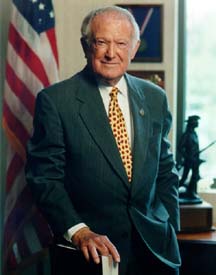- Floyd Spence
Infobox_Congressman
name = Floyd Spence

width = 200
date of birth = birth date|1928|4|9|mf=y
place of birth =Columbia, South Carolina
date of death = death date and age|2001|8|16|1928|4|9|mf=y
place of death =Washington, D.C.
state =South Carolina
district = 2nd
term_start =January 3 ,1971
term_end=August 16 ,2001
preceded = Albert Watson
succeeded = Joe Wilson
party = Democrat (c. 1946-1962)
Republican (1962-2001)
spouse =
religion =Floyd Davidson Spence (
April 9 ,1928 –August 16 ,2001 ) was a Republican politician fromSouth Carolina .Spence was born in
Columbia, South Carolina in 1928, but spent most of his life in nearbyLexington County . Shortly after graduating from high school, he enlisted in the U. S. Naval Reserve, retiring as a captain in 1988. He graduated from theUniversity of South Carolina with a degree in English in 1952, earning a law degree from the same school four years later.Just after leaving law school, Spence was elected to represent Lexington County in the
South Carolina House of Representatives as a Democrat. He was reelected in 1958 and 1960. However, onApril 14 ,1962 , Spence became the first elected official at any level in South Carolina to switch to the Republican Party. He was very uncomfortable with the national Democrats' increasingly liberal platform, and also opposed a loyalty oath required by the state Democrats. On the same day, he announced that he would seek the Republican nomination for the state's 2nd Congressional District, based in Columbia. He'd been asked by several of his friends to run before his switch, especially after the death of its previous congressman,John J. Riley , but declined. He faced fellow state representative Albert Watson of Columbia in November and wasn't given much of a chance.At the time, the Democratic Party was virtually the only party in South Carolina, and Democratic presidential candidates frequently won the state with close to 90% of the popular vote. Indeed, Spence's party switch made him the first Republican in either house of the state legislature since Reconstruction. However, he only lost to Watson by five percentage points. In the same year, Senator
Olin Johnston faced the first credible Republican challenger in a South Carolina Senate race in decades. These two contests are largely credited with beginning the rise of the Republican Party in South Carolina. In 1966, Spence was elected to theSouth Carolina Senate , becoming the chamber's lone Republican. He was reelected in 1968, and naturally became minority leader when he was joined by other Republicans that year.In 1970, Spence ran for the 2nd Congressional District again. Watson, who had defeated Spence eight years before, had become a Republican in 1965 and was running for governor. This time, it was Spence who won a narrow victory. He became the first freshman Republican congressman from South Carolina since Reconstruction. He was unopposed for reelection in the gigantic Republican landslide of 1972 and reelected 14 times thereafter. Early on, he established himself as one of the most conservative members of the House. His first bill in his freshman year was the first-ever balanced-budget amendment to the Constitution.
In 1974, Spence he defeated
Matthew J. Perry , South Carolina's first African American U.S. District Court judge, in what was otherwise a very bad year for Republicans. He didn't face credible opposition again until 1980, when attorney Tom Turnipseed ran against him. However, one of Spence's consultants,Lee Atwater , ran several "push poll s"-- a new tactic at the time--informing voters that Turnipseed was a member of the NAACP. Due to this andRonald Reagan 's strong performance in the district, Spence was reelected with 55 percent of the vote. After cruising to reelection in 1982 and 1984, he only won by seven points in 1986. He faced another tough campaign in 1988. However, the retirement of CongressmanG. William Whitehurst ofVirginia made Spence the second-ranking Republican on theHouse Armed Services Committee , on which Spence had served since his first term. The district includes several military bases, most notably Fort Jackson. He became the committee's ranking Republican in 1993 and chairman of the committee in 1995 when Republicans took control of the House. Largely because of his advances on the committee, Spence was never seriously challenged after 1988, and even ran unopposed from 1990 through 1996. He was also helped by the 1990s round of redistricting, in which most of his black constituents were shifted to the 6th District.Spence renamed the Armed Services Committee the "Committee on National Security" when he took over as chairman. emphasized military readiness, calling it "the best insurance we have both for peace and freedom." He stepped down as chairman after the 106th Congress due to caucus-imposed term limits.
Spence died on
August 16 ,2001 , at the age of 73 from complications following brain surgery, only eight months into his 16th term. He was succeeded by State Representative Joe Wilson, who had been an aide to Spence in the 1970s.External links
Wikimedia Foundation. 2010.
